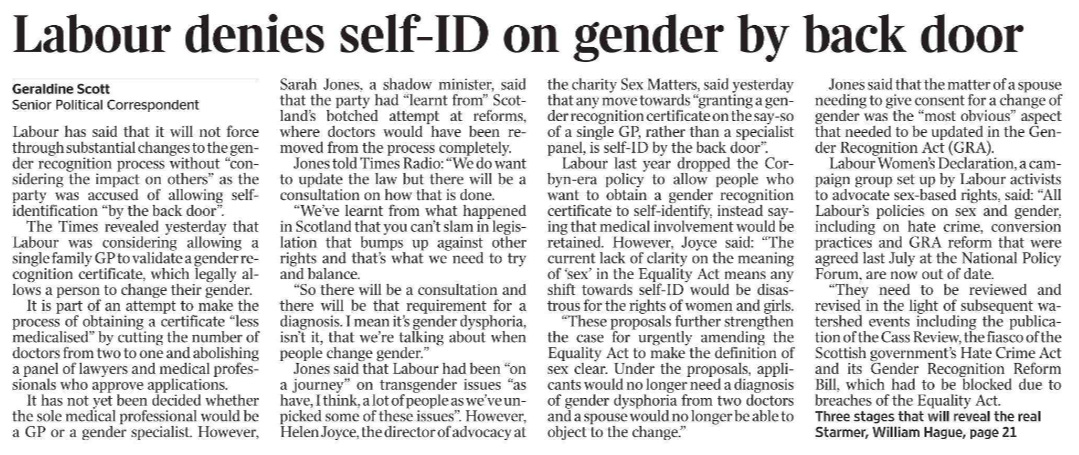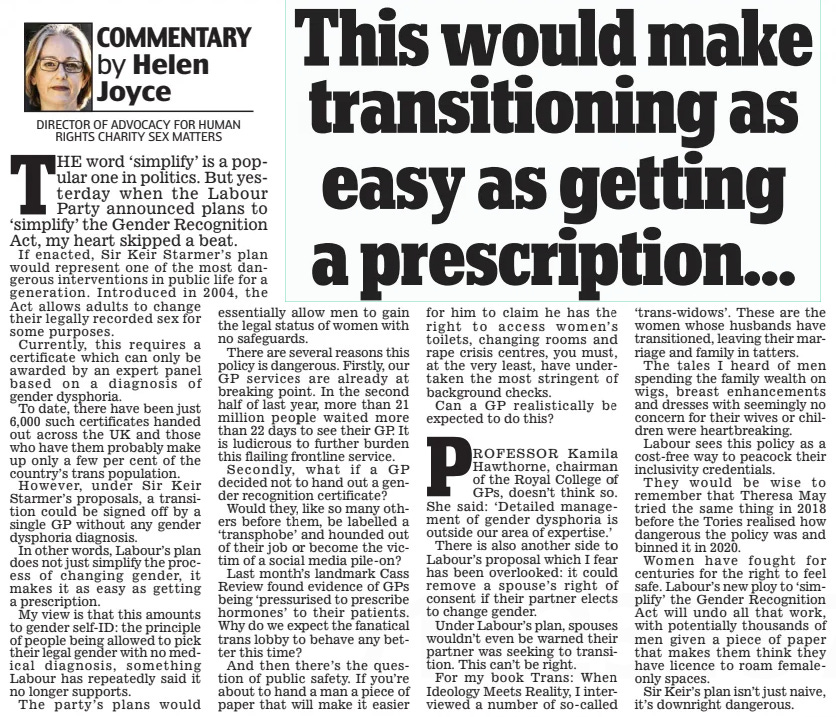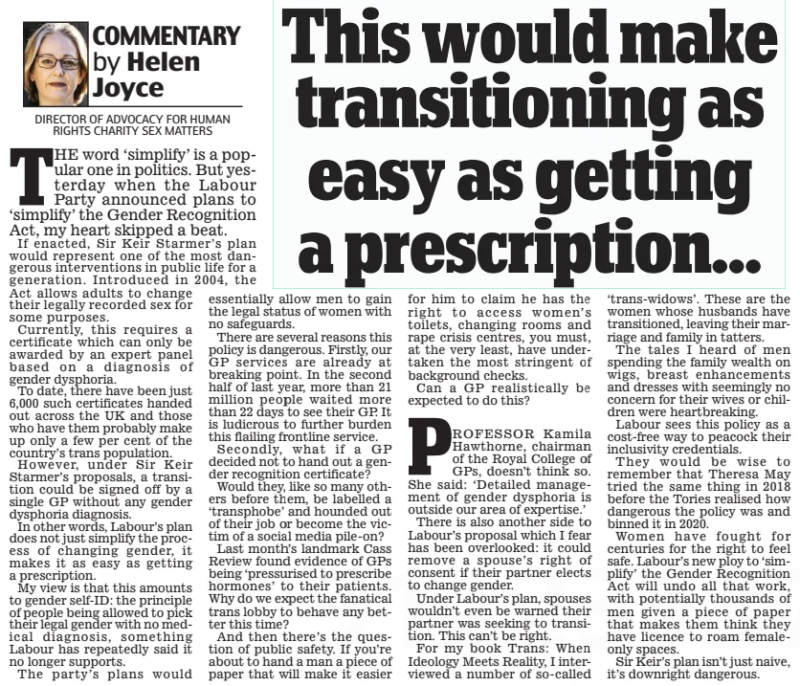On Monday, The Times lead story was “Labour plan for gender change to be made easier”. On Tuesday, they followed that up with a Labour denial. So, was this one of the Labour Party’s fastest u-turns under Keir Starmer or was The Times up to mischief?
![Labour plan for gender change to be made easier Decision could be signed off by single doctor Geraldine Scott - Senior Political Correspondent Labour will make it easier to change gender and is considering allowing a single family doctor to sign off on the decision under plans to “simplify” the process. The party is considering how to make the legally binding certificate easier to obtain while still having “guardrails” to prevent it mirroring controversial proposals in Scotland that would have removed doctors from the process altogether. The plans include ditching a panel of doctors and lawyers who approve gender-recognition certificates, the document allowing transgender people to have their affirmed gender legally recognised, and requiring only one doctor to be involved in the process. The Times understands that one option under consideration is that the doctor could be a GP. Labour would also remove the ability of a spouse to object to the change. A source said the party wanted to make the process “less medicalised” but added that the plans would retain the involvement of a doctor and would not allow people to self-identify in order to obtain legal changes. They said it had not yet been decided whether the medical professional would be a GP or a gender specialist, with the issue likely to go to consultation if the party won the next election. The discussions centre on concerns that if the single doctor were a specialist, a GP would still need to make the referral, therefore retaining the twostep process that Labour wants to drop. There were also questions over whether GPs were qualified or had the capacity to make the decision. The Royal College of GPs said its members were already working under “considerable pressure”. Anneliese Dodds, the shadow women and equalities secretary, said she wanted to strip out the “futile and dehumanising parts” of acquiring a gender-recognition certificate. “We believe everyone should be treated with dignity and respect,” she said. “We want to see the process for gender recognition modernised, while protecting single sex spaces for biological women. This means stripping out the futile and dehumanising parts of the process for obtaining a genderrecognition certificate, while retaining important safeguards.” Last year Labour dropped its stance — introduced under Jeremy Corbyn — that would have allowed people to change their legal sex without a medical diagnosis. However, any perceived relaxation of the process is likely to prompt tough scrutiny from those who fear women may be put at risk. Kemi Badenoch, the women and equalities minister, said that Labour should “allow professionals to do their job properly”. To obtain a gender-recognition certificate currently someone has to be diagnosed with gender dysphoria, have been living in their affirmed gender for two years and intend to live in that gender for the rest of their life. Two medical reports are required, one of them from a specialist, and the application is then considered by a panel. Only about 2 per cent of transgender people have a gender recognition certificate, and it is not required to update a driving licence, passport or medical records, but it does allow people to update their birth certificate, get married or enter into a civil partnership in their affirmed gender, and have it on their death certificate. Proposals in Scotland would have made it easier for a transgender person to obtain a certificate by removing the need for a medical diagnosis altogether. However, the reforms were blocked by the UK government, which said they interfered with equalities legislation. Professor Kamila Hawthorne, chair of the Royal College of GPs, said she would be concerned about “shifting sole responsibility for signing gender recognition certificates to GPs”. She said the college supported improving care for patients with gender dysphoria “including tackling the long waits they face for treatment and services” but that “for most GPs, detailed management of gender dysphoria is outside of our area of expertise.” Badenoch said: “There is no reason whatsoever to relax the safeguards that are in place. [Labour] should stop trying to weaponise this issue and allow professionals to do their job properly.” Labour plan for gender change to be made easier Decision could be signed off by single doctor Geraldine Scott - Senior Political Correspondent Labour will make it easier to change gender and is considering allowing a single family doctor to sign off on the decision under plans to “simplify” the process. The party is considering how to make the legally binding certificate easier to obtain while still having “guardrails” to prevent it mirroring controversial proposals in Scotland that would have removed doctors from the process altogether. The plans include ditching a panel of doctors and lawyers who approve gender-recognition certificates, the document allowing transgender people to have their affirmed gender legally recognised, and requiring only one doctor to be involved in the process. The Times understands that one option under consideration is that the doctor could be a GP. Labour would also remove the ability of a spouse to object to the change. A source said the party wanted to make the process “less medicalised” but added that the plans would retain the involvement of a doctor and would not allow people to self-identify in order to obtain legal changes. They said it had not yet been decided whether the medical professional would be a GP or a gender specialist, with the issue likely to go to consultation if the party won the next election. The discussions centre on concerns that if the single doctor were a specialist, a GP would still need to make the referral, therefore retaining the twostep process that Labour wants to drop. There were also questions over whether GPs were qualified or had the capacity to make the decision. The Royal College of GPs said its members were already working under “considerable pressure”. Anneliese Dodds, the shadow women and equalities secretary, said she wanted to strip out the “futile and dehumanising parts” of acquiring a gender-recognition certificate. “We believe everyone should be treated with dignity and respect,” she said. “We want to see the process for gender recognition modernised, while protecting single sex spaces for biological women. This means stripping out the futile and dehumanising parts of the process for obtaining a genderrecognition certificate, while retaining important safeguards.” Last year Labour dropped its stance — introduced under Jeremy Corbyn — that would have allowed people to change their legal sex without a medical diagnosis. However, any perceived relaxation of the process is likely to prompt tough scrutiny from those who fear women may be put at risk. Kemi Badenoch, the women and equalities minister, said that Labour should “allow professionals to do their job properly”. To obtain a gender-recognition certificate currently someone has to be diagnosed with gender dysphoria, have been living in their affirmed gender for two years and intend to live in that gender for the rest of their life. Two medical reports are required, one of them from a specialist, and the application is then considered by a panel. Only about 2 per cent of transgender people have a gender recognition certificate, and it is not required to update a driving licence, passport or medical records, but it does allow people to update their birth certificate, get married or enter into a civil partnership in their affirmed gender, and have it on their death certificate. Proposals in Scotland would have made it easier for a transgender person to obtain a certificate by removing the need for a medical diagnosis altogether. However, the reforms were blocked by the UK government, which said they interfered with equalities legislation. Professor Kamila Hawthorne, chair of the Royal College of GPs, said she would be concerned about “shifting sole responsibility for signing gender recognition certificates to GPs”. She said the college supported improving care for patients with gender dysphoria “including tackling the long waits they face for treatment and services” but that “for most GPs, detailed management of gender dysphoria is outside of our area of expertise.” Badenoch said: “There is no reason whatsoever to relax the safeguards that are in place. [Labour] should stop trying to weaponise this issue and allow professionals to do their job properly.”](https://substackcdn.com/image/fetch/w_1456,c_limit,f_auto,q_auto:good,fl_progressive:steep/https%3A%2F%2Fsubstack-post-media.s3.amazonaws.com%2Fpublic%2Fimages%2F5172fec6-57a7-46ad-a6e7-55e3a6f7a661_661x846.png)

When it comes to trans people, Keir Starmer and the Labour Party u-turned on their support so long ago that it came as a surprise to see them saying that they would do something vaguely pro-trans. According to Geraldine Scott, whose byline rests above the article, “Labour will make it easier to change gender and is considering allowing a single family doctor to sign off on the decision under plans to “simplify” the process. The party is considering how to make the legally binding certificate easier to obtain while still having “guardrails” to prevent it mirroring controversial proposals in Scotland that would have removed doctors from the process altogether.”
This would involve:
· Considering allowing a single family doctor to sign off on the decision, potentially a GP, instead of a panel of doctors and lawyers.
· Removing the ability of a spouse to object to the gender change.
· Ensuring the process remains “less medicalised” but still involving a doctor’s approval.
· Retaining the requirement for a medical professional’s involvement, without allowing self-identification for legal changes.
· Possible consultation on whether the medical professional should be a GP or a gender specialist if Labour wins the next election.
· Addressing concerns about the current two-step referral process if a specialist is involved, aiming to simplify it.
· Stripping out “futile and dehumanising parts” of the process while maintaining important safeguards.
· Ensuring the modernised process still protects single sex spaces for “biological women”.
The outrage was not long in coming but these are not new proposals.
Annelise Dodds spoke about them almost a year ago.
“Changing gender is not a decision anyone makes lightly,” Dodds wrote on 24 July 2023. “The process is intrusive, outdated and humiliating. So, we will modernise, simplify, and reform the gender recognition law to a new process. We will remove invasive bureaucracy and simplify the process.” She pointed to the “panel of anonymous doctors” saying “This is demeaning for trans people and meaningless in practice. A diagnosis provided by one doctor, with a registrar instead of a panel, should be enough.”
They were outraged back then, too.
Now, Labour are saying they have “learnt from Scotland”. Sarah Jones, a shadow minister, told Times Radio, “We do want to update the law but there will be a consultation on how that is done. We’ve learnt from what happened in Scotland that you can’t slam in legislation that bumps up against other rights and that’s what we need to try and balance. So there will be a consultation and there will be that requirement for a diagnosis. I mean it’s gender dysphoria, isn’t it, that we’re talking about when people change gender.”
You will remember that what happened in Scotland was one of the largest – and longest – public consultations to ever take place with cross-party support and consensus. Over 17,000 responses were submitted. When it didn’t go their way, the Gender Critical Sex Realists whipped up a contrived moral panic, the English press jumped on board, and the UK government stepped in to piss all over Scotland’s devolved government. The SNP, who had championed the change, ran out of fight as they dealt with their own internal conflicts.
Contrary to what they claim, Labour have not learned from Scotland because what Scotland found during their process was the same as every other country that has legalised self-ID – there is no bumping against other rights. What Scotland did was pass legislation that was widely supported. What England did was deny Scotland that right.
No, Labour are not learning from Scotland. Labour are learning from the Tufton-Street crew.
Layperson Helen Joyce gets involved
The specific claim that Labour are planning on introducing ‘self-ID by the backdoor’ seems to come from Helen Joyce, she of Sex Maters and reading-on-a-train-Harry Potter-non-con-porn-featuring-schoolkids fame (is that podcast out yet, btw?). She appears to have read The Times article on Monday, coined the ‘self-ID by the backdoor’ bit and promptly wrote a column for Tuesday’s Daily Mail, with a quote thrown to The Times for all their hard work rerunning a year-old story in the first place, giving her the chance to earn a few more pounds while spreading her ideology some more. Win-win!
Her article is a mess.

To Joyce, getting a GRC via a GP “amounts to gender self-ID: the principle of people being allowed to pick their legal gender with no medical diagnosis, something Labour has repeatedly said it no longer supports.” Perhaps she should Google what profession GPs are part of. After that, she can look up what a GRC does because either she still doesn’t know or she is pretending not to. Either way, you can see why that Australian court refused to accept her testimony due to her status as a layperson. “And then there’s the question of public safety,” Joyce writes, summoning up the threat of a trans woman lurking near you. “If you’re about to hand a man a piece of paper that will make it easier for him to claim he has the right to access women’s toilets, changing rooms and rape crisis centres, you must, at the very least, have undertaken the most stringent of background checks.” For the hard of thinking at the back – a GRC is not needed to access any of those spaces but good to know Joyce doesn’t object to GRCs entirely.
As you’ll notice, Joyce also appears to think that trans people should have “the most stringent of background checks”. I guess that’s because “every one of those [trans] people is basically, you know, a huge problem to a sane world.” Is that what a ‘sane world’ looks like to Helen Joyce? Background checks before treatment? I’m sure there’s a word for that, but it’s just not coming to me.
In this anti-trans activist’s ‘sane world’, Drs are also encouraged to disclose confidential medical information to people other than their patient. “Under Labour’s plan, spouses wouldn’t even be warned their partner was seeking to transition. This can’t be right,” Joyce cries. Do you think Joyce can list other medical treatments that require a partner be informed? Or require a public consultation to determine the impact on strangers before being authorised? Do you think Joyce believes the Dr. of Kathleen Stock, who came out late in life, should have informed her now ex-husband that he was married to a lesbian before Stock got the chance herself? But she doesn’t just want wives informed. “There is also another side to Labour’s proposal which I fear has been overlooked,” she says, “it could remove a spouse’s right of consent if their partner elects to change gender.” Anti-body autonomy is the new feminism.
As if all that isn’t absurd enough for one article, the day after the infected blood inquiry released its findings that the government and NHS had knowingly infected tens of thousands of people, thousands of whom died, and then covered it up for decades, Joyce wrote, “If enacted, Sir Keir Starmer’s plan would represent one of the most dangerous interventions in public life for a generation.”
I wish that was all, but you’ve read it. You’ve seen the rest. Maybe one day they will all realise they appear every bit as deluded as they claim trans people to be. And I say ‘they’ because they all sound the same, repeat the same lines. Any one of them could have written this drivel about how they spend their time imaging untold predators waving around bits of paper to get access to spaces, most of which they can already access with ease. Rape, but with extra steps for the admin fetishists. “Women have fought for centuries for the right to feel safe,” Joyce says with no argument from me. “Labour’s new ploy to ‘simplify’ the Gender Recognition Act will undo all that work, with potentially thousands of men given a piece of paper that makes them think they have licence to roam female only spaces.”
You can’t reason with the sort of mind that obsesses over this sort of stuff every single day despite all the evidence around the world showing them their worst fears are completely unfounded.
They do not see because they do not want to see.
“Sir Keir’s plan isn’t just naïve, it’s downright dangerous,” Joyce concludes, despite providing no evidence to back up this assertion. All she offers is all she has – her view from behind a boarded up window of the ‘sane world’ she imagines lies just outside.
Oh, and the answer to the question posed in the headline of this piece, “Do Labour want to update gender-ID law?” Nobody really knows because they say ‘yes’ out of one side of their mouth while spitting ‘no’ with the other.
